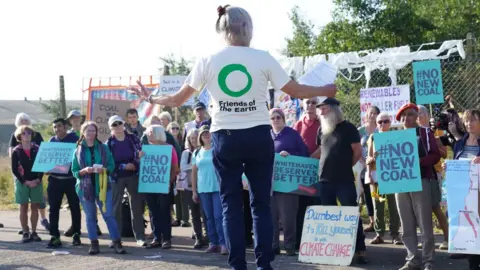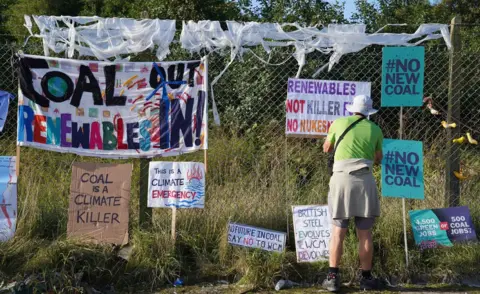Whitehaven coal mine: Plans attacked at inquiry
 PA Media
PA MediaResidents and campaigners have attacked plans for the UK's first deep coal mine in 30 years at a planning inquiry.
The planning inspector is considering West Cumbria Mining's application for the colliery near Whitehaven.
Resident Martin Kendall said it would "pollute the environment" and harm a "beautiful place".
Irene Sanderson from North Cumbria CND raised concerns about the water supply to Sellafield. Proponents of the mine say the benefits outweigh the costs.
The proposed mine would remove coking coal from beneath the Irish Sea for the production of steel in the UK and Europe.
However, critics believe the scheme would damage the UK's commitment to cut carbon dioxide emissions and harm its credibility ahead of hosting the Cop26 international climate summit in November.
 Getty Images
Getty ImagesMr Kendall, who has previously campaigned against the plans, told the hearing: "I don't want my home in Pow Beck Valley being blighted with ugly coal wagons shunted into railway sidings, and no amount of tree planting is going to reduce their impact on this beautiful place in the countryside.
"I feel many people think carbon neutral means the coal mine will not be polluting. However, in planning documents pollutants are mitigated, or minimised, and for me the carbon offsetting that West Cumbria Mining has planned does not go far enough.
"The coal mine will be polluting my environment with gas emissions vented into the atmosphere, the diesel engines transporting the materials in and the coal away, the noise and light and smell of the coal mine, and the vast amount of fresh water it needs for the manufacturing process."
He said should the government approve the mine it would "not be the actions of a climate leader" and that the coal "needs to stay in the ground".
 PA Media
PA MediaMs Sanderson said her organisation was against the plans because of concerns over the impact on decommissioning Sellafield and the "complex task" of supplying of water to the plant, alongside fears about potential radiation pollution.
Professor Terry Sloan, from climate community group Sustainable Keswick, said it was opposed to the plans as opening a new coal mine "simply encourages" steelmaking to keep using it by keeping the price low, rather than encouraging newer technologies.
On Tuesday, Gregory Jones QC, acting for West Cumbria Mining, said the "reality" was that the steel industry would need coking coal "for many years", despite advances in so-called "green steel" made without coal.
The company has claimed the mine would create 530 permanent jobs, with a commitment to fill 80% of those using local people.
'Myopic opponents'
Speaking in support of the mine, David Douglass, a "lifelong coal miner" and official from the National Union of Mineworkers, said many of the objections were based on "confusion and misinformation".
He said contrary to some posters held up by protesters, the coal would not be used in power generation but rather the steelmaking industry, which is a key player in producing renewable energy projects such as wind turbines.
Mr Douglass said coal was "essential for the production of steel" and the coal from the West Cumbria mine would "displace coal being transported from across the world", therefore reducing emissions.
He said "myopic opponents" would rely on coal mined from abroad which would be less green than if it came from the Whitehaven operation.
Chris Whiteside, county councillor for Egremont North and St Bees, said the jobs promised by the scheme would "enormously help the local economy" in an area of deprivation.
He also said the benefits would outweigh the impact, adding: "If you want more renewable energy you need steel."
Emma Williamson, county councillor for Kells and Sandwith, said: "Climate change is here, that is undeniable, but so is poverty and deprivation in Copeland. We need urgent investment now."
Planning inspector Stephen Normington is chairing the hearing, which is expected to last for 16 days.
Cumbria County Council, which had approved the mine to operate up until 2049 before suspending the permission to further consider carbon policy "implications", has said it would adopt a "neutral position" during the inquiry.
West Cumbria Mining previously said exploratory works led it to estimate there were about 750m tonnes of "excellent quality" coking coal in the area.
However, the company would be limited by planning conditions to produce no more than 2.78m tonnes a year.

Follow BBC North East & Cumbria on Twitter, Facebook and Instagram. Send your story ideas to northeastandcumbria@bbc.co.uk.